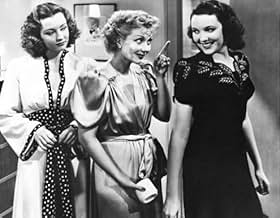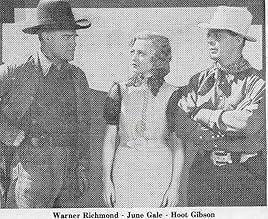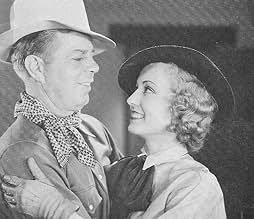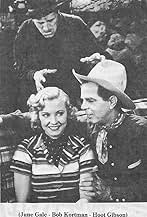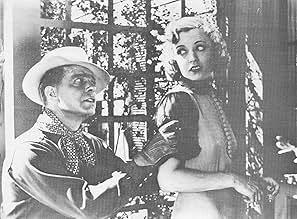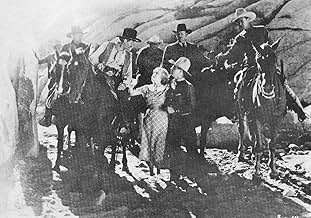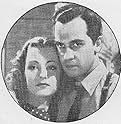June Gale(1911-1996)
- Actress
- Additional Crew
Best known as Mrs. Oscar Levant and for the acute tabloid problems that accompanied that title, gorgeous blonde actress June Gale started things off in a vaudeville sister act that led to her becoming a Broadway and second-string movie actress of the 1930s.
June began life as twin Doris Gilmartin on July 6, 1911 in San Francisco along with her sister Helen. Another set of twins would arrive just fourteen months later in the form of Lenare and Lorraine. The Gilmartin family would relocate to New York City in the early 1920s with all four young girls quickly catching the performing bug.
A clever and intriguing (albeit incorrect) marquee billing as The Gale Quadruplets saw the light initially in vaudeville as a four girl dance act. Teenagers June and her renamed sisters Jane Gale (1911- ), Joan Gale (1912-1998) and Jean Gale (1912-1974) quickly made it to Broadway with the shows "Flying High" (1930) and "George White's Scandals (1931). They then headed West and made their first film with the Vitaphone short Poor Little Rich Boy (1932). Living in constant fear that their "quadruplet" scam would be found out, they decided to break up soon after this. While the others quickly put their careers on hold and settled down to marry, June ventured on, but the others too would have a very modest film career of their own.
June, in retrospect, would have the most endurable success of the four. She made her solo debut as a Goldwyn Girl in Eddie Cantor's Roman Scandals (1933) and continued on in decorative show girl type bits with Moulin Rouge (1934), Melody in Spring (1934) (also with Joan and Jane), Bottoms Up (1934) (also with Jean), Young and Beautiful (1934), both the US and French versions of _Folies Bergere de Paris (1935)_, Sing, Baby, Sing (1936) and Pigskin Parade (1936). Film westerns finally opened their doors to June by handing her co-leads opposite cowboy stars Hoot Gibson in Rainbow's End (1935), Swifty (1935) and The Riding Avenger (1936) and Ken Maynard in Heroes of the Range (1936). She and Gibson became an item during this time.
Signed by Fox after this string of visible roles, a disappointed and frustrated June was relegated back to bit parts once again with nothing roles in One in a Million (1936), Pigskin Parade (1936), On the Avenue (1937), Sing and Be Happy (1937) and Thin Ice (1937). She had a better role when she was loaned out to play opposite Kane Richmond and Frankie Darro in the crimer The Devil Diamond (1937). After June took some time off away from the studio to co-star in a touring stage company of "Stage Door," the studio took better care of their client upon her return with co-starring and/or featured roles in the "B" films Time Out for Murder (1938), While New York Sleeps (1938), Pardon Our Nerve (1939), Inside Story (1939), The Jones Family in Hollywood (1939) It Could Happen to You (1939), Hotel for Women (1939), Charlie Chan at Treasure Island (1939), The Escape (1939), The Honeymoon's Over (1939) and City of Chance (1940).
In 1939, life changed entirely for June when she met and married the composer and pianist extraordinaire Oscar Levant. Putting aside her career completely, she lived with this witty genius and quickly tried to learn how to cope with his chronic hypochondria and acute mood swings. That and raising their three daughters Marcia, Lorna and Amanda would become a full time job to say the least. The marriage itself was loud and noisy from the very start. Constant physical battles, emotional tirades, separations, reconciliations and suicide attempts (on both parts) made for tabloid headlines news. It was not long before the couple became known nationwide as the "Feudin' and Fussin' Levants of Beverly Hills."
After a decade and a half's absence, June finally returned to face the camera in 1956 as the co-host of a local TV show (KCOP) called "The Oscar Levant Show." Working together with her husband was probably not the wisest idea and it certainly showed on camera. One day June simply walked away from the show. KCOP happily gave her a talk show of her own, "The June Levant Show," for which she would be nominated for a local Emmy Award. June also earned a small part on a 1962 episode of "The Alfred Hitchcock Hour" and appeared occasionally on talk shows with Jack Paar, Merv Griffin and the like. After this she would preoccupy herself with the Los Angeles stage, appearing in various comedies and dramas including "The Butter and Egg Man," "A Taste of Honey," A Delicate Balance" and "Richard II."
The marriage of the "Battling Levants" finally ended with the death of Oscar in 1972 after the 66-year-old fell victim to a heart attack. In 1978 June wed screenwriter Henry Ephron but they divorced four years later. In her twilight years the former actress wrote and worked to keep the name and work of Oscar Levant alive. Singer/musician/songwriter Michael Feinstein would become a protégé of hers and she subsequently hired him to catalog Levant's compositions.
June died at age 85 of pneumonia in Los Angeles and was interred there at Westwood Memorial Park.
June began life as twin Doris Gilmartin on July 6, 1911 in San Francisco along with her sister Helen. Another set of twins would arrive just fourteen months later in the form of Lenare and Lorraine. The Gilmartin family would relocate to New York City in the early 1920s with all four young girls quickly catching the performing bug.
A clever and intriguing (albeit incorrect) marquee billing as The Gale Quadruplets saw the light initially in vaudeville as a four girl dance act. Teenagers June and her renamed sisters Jane Gale (1911- ), Joan Gale (1912-1998) and Jean Gale (1912-1974) quickly made it to Broadway with the shows "Flying High" (1930) and "George White's Scandals (1931). They then headed West and made their first film with the Vitaphone short Poor Little Rich Boy (1932). Living in constant fear that their "quadruplet" scam would be found out, they decided to break up soon after this. While the others quickly put their careers on hold and settled down to marry, June ventured on, but the others too would have a very modest film career of their own.
June, in retrospect, would have the most endurable success of the four. She made her solo debut as a Goldwyn Girl in Eddie Cantor's Roman Scandals (1933) and continued on in decorative show girl type bits with Moulin Rouge (1934), Melody in Spring (1934) (also with Joan and Jane), Bottoms Up (1934) (also with Jean), Young and Beautiful (1934), both the US and French versions of _Folies Bergere de Paris (1935)_, Sing, Baby, Sing (1936) and Pigskin Parade (1936). Film westerns finally opened their doors to June by handing her co-leads opposite cowboy stars Hoot Gibson in Rainbow's End (1935), Swifty (1935) and The Riding Avenger (1936) and Ken Maynard in Heroes of the Range (1936). She and Gibson became an item during this time.
Signed by Fox after this string of visible roles, a disappointed and frustrated June was relegated back to bit parts once again with nothing roles in One in a Million (1936), Pigskin Parade (1936), On the Avenue (1937), Sing and Be Happy (1937) and Thin Ice (1937). She had a better role when she was loaned out to play opposite Kane Richmond and Frankie Darro in the crimer The Devil Diamond (1937). After June took some time off away from the studio to co-star in a touring stage company of "Stage Door," the studio took better care of their client upon her return with co-starring and/or featured roles in the "B" films Time Out for Murder (1938), While New York Sleeps (1938), Pardon Our Nerve (1939), Inside Story (1939), The Jones Family in Hollywood (1939) It Could Happen to You (1939), Hotel for Women (1939), Charlie Chan at Treasure Island (1939), The Escape (1939), The Honeymoon's Over (1939) and City of Chance (1940).
In 1939, life changed entirely for June when she met and married the composer and pianist extraordinaire Oscar Levant. Putting aside her career completely, she lived with this witty genius and quickly tried to learn how to cope with his chronic hypochondria and acute mood swings. That and raising their three daughters Marcia, Lorna and Amanda would become a full time job to say the least. The marriage itself was loud and noisy from the very start. Constant physical battles, emotional tirades, separations, reconciliations and suicide attempts (on both parts) made for tabloid headlines news. It was not long before the couple became known nationwide as the "Feudin' and Fussin' Levants of Beverly Hills."
After a decade and a half's absence, June finally returned to face the camera in 1956 as the co-host of a local TV show (KCOP) called "The Oscar Levant Show." Working together with her husband was probably not the wisest idea and it certainly showed on camera. One day June simply walked away from the show. KCOP happily gave her a talk show of her own, "The June Levant Show," for which she would be nominated for a local Emmy Award. June also earned a small part on a 1962 episode of "The Alfred Hitchcock Hour" and appeared occasionally on talk shows with Jack Paar, Merv Griffin and the like. After this she would preoccupy herself with the Los Angeles stage, appearing in various comedies and dramas including "The Butter and Egg Man," "A Taste of Honey," A Delicate Balance" and "Richard II."
The marriage of the "Battling Levants" finally ended with the death of Oscar in 1972 after the 66-year-old fell victim to a heart attack. In 1978 June wed screenwriter Henry Ephron but they divorced four years later. In her twilight years the former actress wrote and worked to keep the name and work of Oscar Levant alive. Singer/musician/songwriter Michael Feinstein would become a protégé of hers and she subsequently hired him to catalog Levant's compositions.
June died at age 85 of pneumonia in Los Angeles and was interred there at Westwood Memorial Park.

